College Education: Personal Reasons and Future Concerns
VerifiedAdded on 2020/04/01
|5
|1469
|189
Essay
AI Summary
This essay delves into the significance of college education, outlining its impact on personal and career development. It emphasizes the importance of higher education for securing job opportunities, fostering independence, and achieving long-term goals. The author discusses the benefits of college, including the development of essential skills, the ability to choose a career path, and the potential for higher earnings. Furthermore, the essay addresses the challenges associated with college life, such as time management, financial struggles, social integration, and academic performance. The author provides insights into how these challenges can be overcome through effective strategies like time management, financial planning, and seeking support. The essay concludes by highlighting the overall importance of college education in today's job market and the numerous advantages it offers compared to a high school diploma. It emphasizes the value of college in promoting skills, experience, and personal growth.
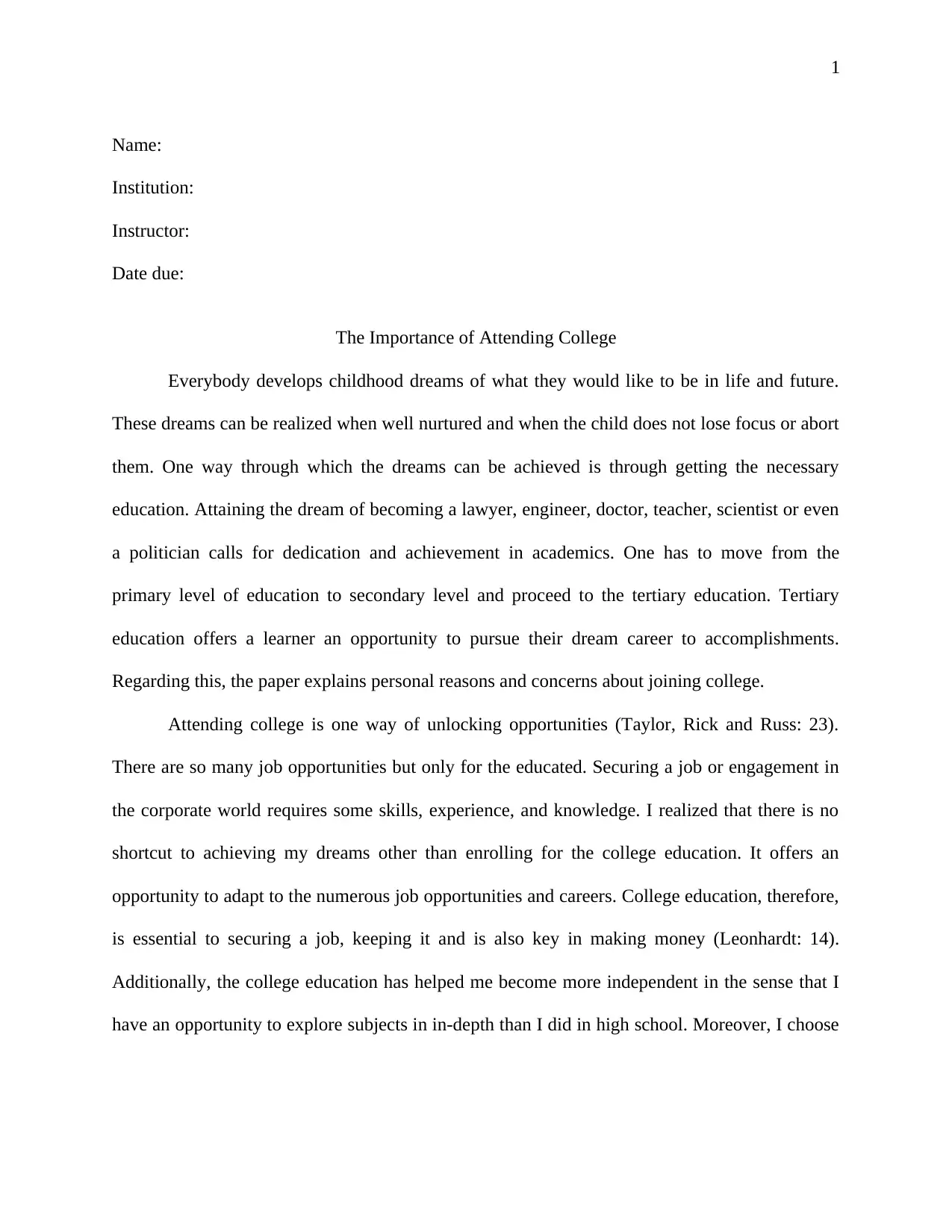
1
Name:
Institution:
Instructor:
Date due:
The Importance of Attending College
Everybody develops childhood dreams of what they would like to be in life and future.
These dreams can be realized when well nurtured and when the child does not lose focus or abort
them. One way through which the dreams can be achieved is through getting the necessary
education. Attaining the dream of becoming a lawyer, engineer, doctor, teacher, scientist or even
a politician calls for dedication and achievement in academics. One has to move from the
primary level of education to secondary level and proceed to the tertiary education. Tertiary
education offers a learner an opportunity to pursue their dream career to accomplishments.
Regarding this, the paper explains personal reasons and concerns about joining college.
Attending college is one way of unlocking opportunities (Taylor, Rick and Russ: 23).
There are so many job opportunities but only for the educated. Securing a job or engagement in
the corporate world requires some skills, experience, and knowledge. I realized that there is no
shortcut to achieving my dreams other than enrolling for the college education. It offers an
opportunity to adapt to the numerous job opportunities and careers. College education, therefore,
is essential to securing a job, keeping it and is also key in making money (Leonhardt: 14).
Additionally, the college education has helped me become more independent in the sense that I
have an opportunity to explore subjects in in-depth than I did in high school. Moreover, I choose
Name:
Institution:
Instructor:
Date due:
The Importance of Attending College
Everybody develops childhood dreams of what they would like to be in life and future.
These dreams can be realized when well nurtured and when the child does not lose focus or abort
them. One way through which the dreams can be achieved is through getting the necessary
education. Attaining the dream of becoming a lawyer, engineer, doctor, teacher, scientist or even
a politician calls for dedication and achievement in academics. One has to move from the
primary level of education to secondary level and proceed to the tertiary education. Tertiary
education offers a learner an opportunity to pursue their dream career to accomplishments.
Regarding this, the paper explains personal reasons and concerns about joining college.
Attending college is one way of unlocking opportunities (Taylor, Rick and Russ: 23).
There are so many job opportunities but only for the educated. Securing a job or engagement in
the corporate world requires some skills, experience, and knowledge. I realized that there is no
shortcut to achieving my dreams other than enrolling for the college education. It offers an
opportunity to adapt to the numerous job opportunities and careers. College education, therefore,
is essential to securing a job, keeping it and is also key in making money (Leonhardt: 14).
Additionally, the college education has helped me become more independent in the sense that I
have an opportunity to explore subjects in in-depth than I did in high school. Moreover, I choose
Paraphrase This Document
Need a fresh take? Get an instant paraphrase of this document with our AI Paraphraser
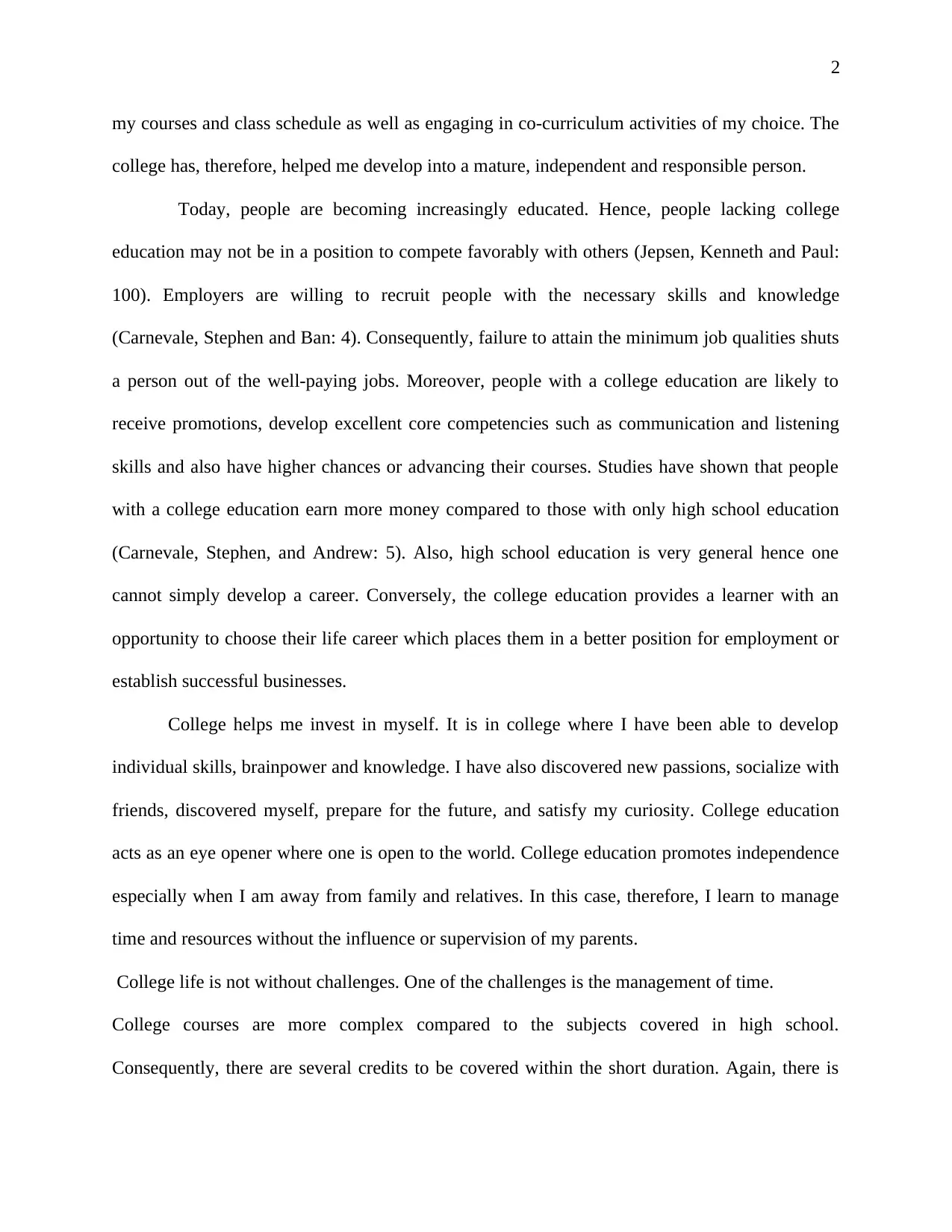
2
my courses and class schedule as well as engaging in co-curriculum activities of my choice. The
college has, therefore, helped me develop into a mature, independent and responsible person.
Today, people are becoming increasingly educated. Hence, people lacking college
education may not be in a position to compete favorably with others (Jepsen, Kenneth and Paul:
100). Employers are willing to recruit people with the necessary skills and knowledge
(Carnevale, Stephen and Ban: 4). Consequently, failure to attain the minimum job qualities shuts
a person out of the well-paying jobs. Moreover, people with a college education are likely to
receive promotions, develop excellent core competencies such as communication and listening
skills and also have higher chances or advancing their courses. Studies have shown that people
with a college education earn more money compared to those with only high school education
(Carnevale, Stephen, and Andrew: 5). Also, high school education is very general hence one
cannot simply develop a career. Conversely, the college education provides a learner with an
opportunity to choose their life career which places them in a better position for employment or
establish successful businesses.
College helps me invest in myself. It is in college where I have been able to develop
individual skills, brainpower and knowledge. I have also discovered new passions, socialize with
friends, discovered myself, prepare for the future, and satisfy my curiosity. College education
acts as an eye opener where one is open to the world. College education promotes independence
especially when I am away from family and relatives. In this case, therefore, I learn to manage
time and resources without the influence or supervision of my parents.
College life is not without challenges. One of the challenges is the management of time.
College courses are more complex compared to the subjects covered in high school.
Consequently, there are several credits to be covered within the short duration. Again, there is
my courses and class schedule as well as engaging in co-curriculum activities of my choice. The
college has, therefore, helped me develop into a mature, independent and responsible person.
Today, people are becoming increasingly educated. Hence, people lacking college
education may not be in a position to compete favorably with others (Jepsen, Kenneth and Paul:
100). Employers are willing to recruit people with the necessary skills and knowledge
(Carnevale, Stephen and Ban: 4). Consequently, failure to attain the minimum job qualities shuts
a person out of the well-paying jobs. Moreover, people with a college education are likely to
receive promotions, develop excellent core competencies such as communication and listening
skills and also have higher chances or advancing their courses. Studies have shown that people
with a college education earn more money compared to those with only high school education
(Carnevale, Stephen, and Andrew: 5). Also, high school education is very general hence one
cannot simply develop a career. Conversely, the college education provides a learner with an
opportunity to choose their life career which places them in a better position for employment or
establish successful businesses.
College helps me invest in myself. It is in college where I have been able to develop
individual skills, brainpower and knowledge. I have also discovered new passions, socialize with
friends, discovered myself, prepare for the future, and satisfy my curiosity. College education
acts as an eye opener where one is open to the world. College education promotes independence
especially when I am away from family and relatives. In this case, therefore, I learn to manage
time and resources without the influence or supervision of my parents.
College life is not without challenges. One of the challenges is the management of time.
College courses are more complex compared to the subjects covered in high school.
Consequently, there are several credits to be covered within the short duration. Again, there is
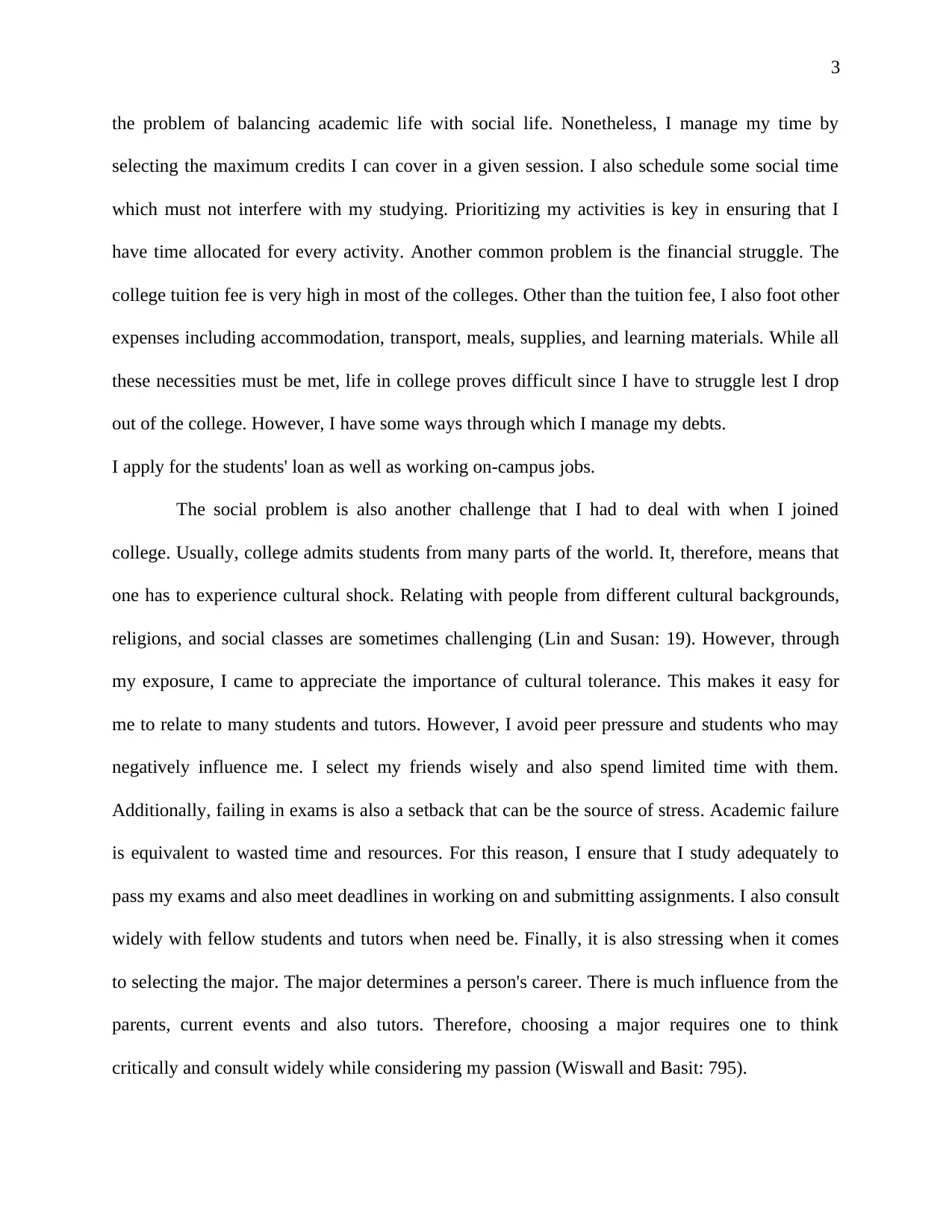
3
the problem of balancing academic life with social life. Nonetheless, I manage my time by
selecting the maximum credits I can cover in a given session. I also schedule some social time
which must not interfere with my studying. Prioritizing my activities is key in ensuring that I
have time allocated for every activity. Another common problem is the financial struggle. The
college tuition fee is very high in most of the colleges. Other than the tuition fee, I also foot other
expenses including accommodation, transport, meals, supplies, and learning materials. While all
these necessities must be met, life in college proves difficult since I have to struggle lest I drop
out of the college. However, I have some ways through which I manage my debts.
I apply for the students' loan as well as working on-campus jobs.
The social problem is also another challenge that I had to deal with when I joined
college. Usually, college admits students from many parts of the world. It, therefore, means that
one has to experience cultural shock. Relating with people from different cultural backgrounds,
religions, and social classes are sometimes challenging (Lin and Susan: 19). However, through
my exposure, I came to appreciate the importance of cultural tolerance. This makes it easy for
me to relate to many students and tutors. However, I avoid peer pressure and students who may
negatively influence me. I select my friends wisely and also spend limited time with them.
Additionally, failing in exams is also a setback that can be the source of stress. Academic failure
is equivalent to wasted time and resources. For this reason, I ensure that I study adequately to
pass my exams and also meet deadlines in working on and submitting assignments. I also consult
widely with fellow students and tutors when need be. Finally, it is also stressing when it comes
to selecting the major. The major determines a person's career. There is much influence from the
parents, current events and also tutors. Therefore, choosing a major requires one to think
critically and consult widely while considering my passion (Wiswall and Basit: 795).
the problem of balancing academic life with social life. Nonetheless, I manage my time by
selecting the maximum credits I can cover in a given session. I also schedule some social time
which must not interfere with my studying. Prioritizing my activities is key in ensuring that I
have time allocated for every activity. Another common problem is the financial struggle. The
college tuition fee is very high in most of the colleges. Other than the tuition fee, I also foot other
expenses including accommodation, transport, meals, supplies, and learning materials. While all
these necessities must be met, life in college proves difficult since I have to struggle lest I drop
out of the college. However, I have some ways through which I manage my debts.
I apply for the students' loan as well as working on-campus jobs.
The social problem is also another challenge that I had to deal with when I joined
college. Usually, college admits students from many parts of the world. It, therefore, means that
one has to experience cultural shock. Relating with people from different cultural backgrounds,
religions, and social classes are sometimes challenging (Lin and Susan: 19). However, through
my exposure, I came to appreciate the importance of cultural tolerance. This makes it easy for
me to relate to many students and tutors. However, I avoid peer pressure and students who may
negatively influence me. I select my friends wisely and also spend limited time with them.
Additionally, failing in exams is also a setback that can be the source of stress. Academic failure
is equivalent to wasted time and resources. For this reason, I ensure that I study adequately to
pass my exams and also meet deadlines in working on and submitting assignments. I also consult
widely with fellow students and tutors when need be. Finally, it is also stressing when it comes
to selecting the major. The major determines a person's career. There is much influence from the
parents, current events and also tutors. Therefore, choosing a major requires one to think
critically and consult widely while considering my passion (Wiswall and Basit: 795).
⊘ This is a preview!⊘
Do you want full access?
Subscribe today to unlock all pages.

Trusted by 1+ million students worldwide
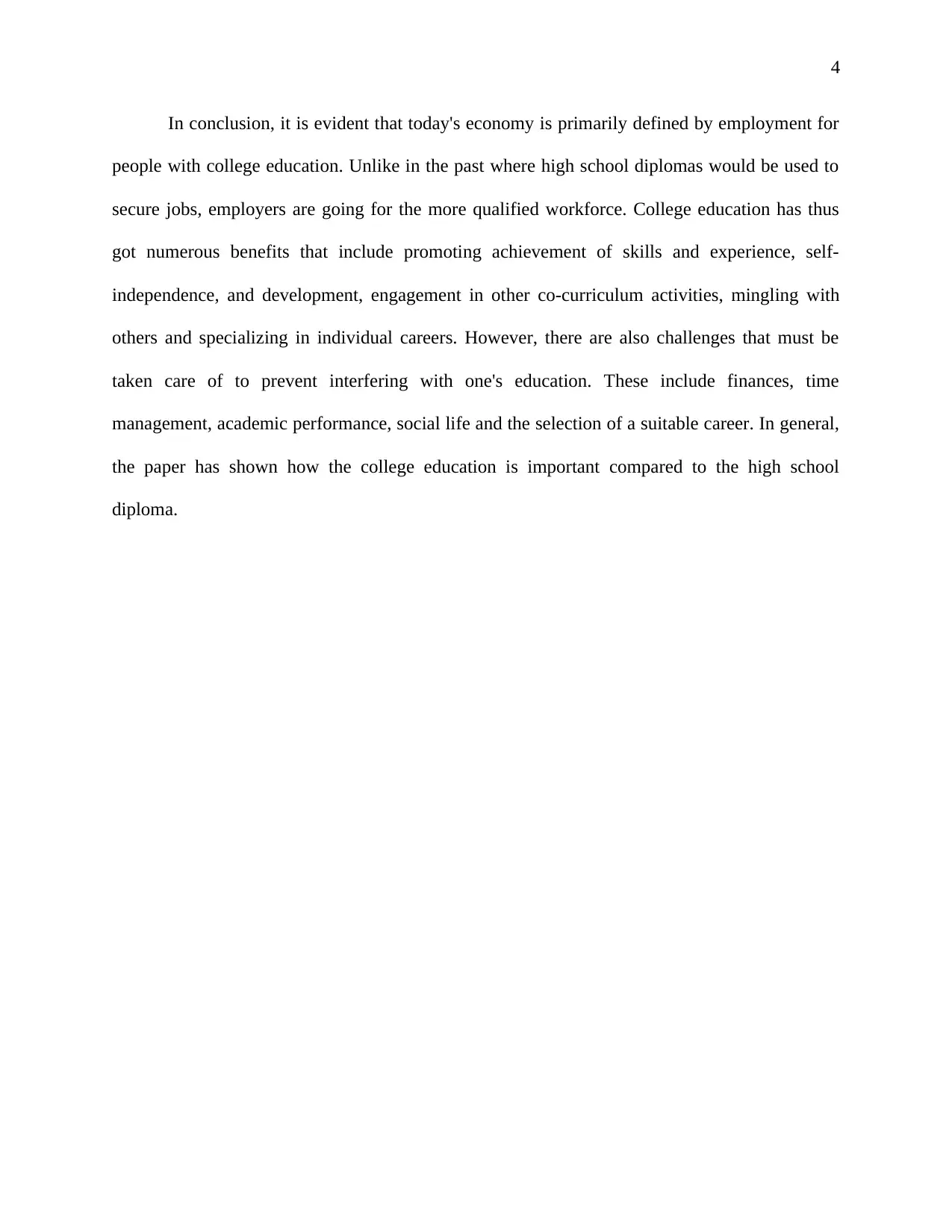
4
In conclusion, it is evident that today's economy is primarily defined by employment for
people with college education. Unlike in the past where high school diplomas would be used to
secure jobs, employers are going for the more qualified workforce. College education has thus
got numerous benefits that include promoting achievement of skills and experience, self-
independence, and development, engagement in other co-curriculum activities, mingling with
others and specializing in individual careers. However, there are also challenges that must be
taken care of to prevent interfering with one's education. These include finances, time
management, academic performance, social life and the selection of a suitable career. In general,
the paper has shown how the college education is important compared to the high school
diploma.
In conclusion, it is evident that today's economy is primarily defined by employment for
people with college education. Unlike in the past where high school diplomas would be used to
secure jobs, employers are going for the more qualified workforce. College education has thus
got numerous benefits that include promoting achievement of skills and experience, self-
independence, and development, engagement in other co-curriculum activities, mingling with
others and specializing in individual careers. However, there are also challenges that must be
taken care of to prevent interfering with one's education. These include finances, time
management, academic performance, social life and the selection of a suitable career. In general,
the paper has shown how the college education is important compared to the high school
diploma.
Paraphrase This Document
Need a fresh take? Get an instant paraphrase of this document with our AI Paraphraser
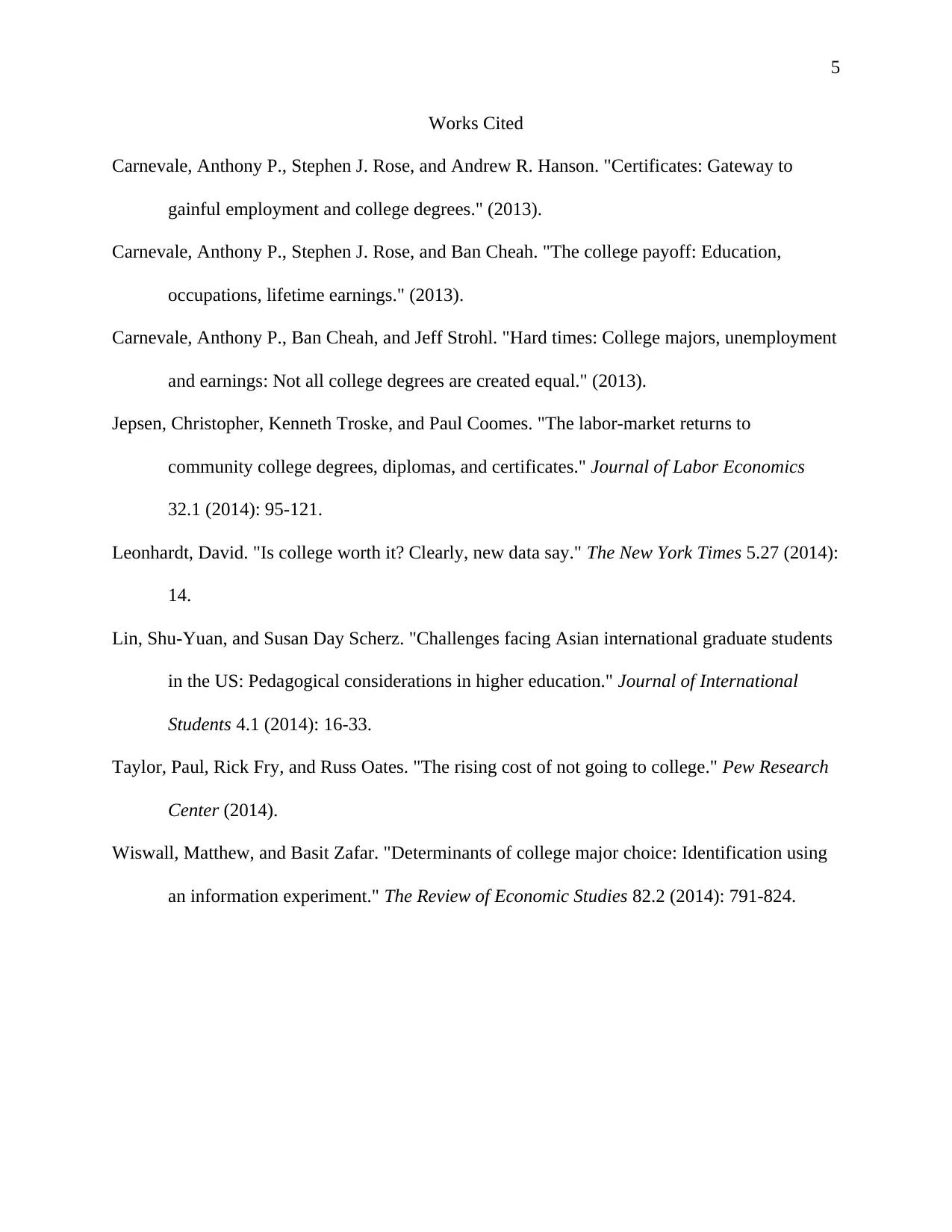
5
Works Cited
Carnevale, Anthony P., Stephen J. Rose, and Andrew R. Hanson. "Certificates: Gateway to
gainful employment and college degrees." (2013).
Carnevale, Anthony P., Stephen J. Rose, and Ban Cheah. "The college payoff: Education,
occupations, lifetime earnings." (2013).
Carnevale, Anthony P., Ban Cheah, and Jeff Strohl. "Hard times: College majors, unemployment
and earnings: Not all college degrees are created equal." (2013).
Jepsen, Christopher, Kenneth Troske, and Paul Coomes. "The labor-market returns to
community college degrees, diplomas, and certificates." Journal of Labor Economics
32.1 (2014): 95-121.
Leonhardt, David. "Is college worth it? Clearly, new data say." The New York Times 5.27 (2014):
14.
Lin, Shu-Yuan, and Susan Day Scherz. "Challenges facing Asian international graduate students
in the US: Pedagogical considerations in higher education." Journal of International
Students 4.1 (2014): 16-33.
Taylor, Paul, Rick Fry, and Russ Oates. "The rising cost of not going to college." Pew Research
Center (2014).
Wiswall, Matthew, and Basit Zafar. "Determinants of college major choice: Identification using
an information experiment." The Review of Economic Studies 82.2 (2014): 791-824.
Works Cited
Carnevale, Anthony P., Stephen J. Rose, and Andrew R. Hanson. "Certificates: Gateway to
gainful employment and college degrees." (2013).
Carnevale, Anthony P., Stephen J. Rose, and Ban Cheah. "The college payoff: Education,
occupations, lifetime earnings." (2013).
Carnevale, Anthony P., Ban Cheah, and Jeff Strohl. "Hard times: College majors, unemployment
and earnings: Not all college degrees are created equal." (2013).
Jepsen, Christopher, Kenneth Troske, and Paul Coomes. "The labor-market returns to
community college degrees, diplomas, and certificates." Journal of Labor Economics
32.1 (2014): 95-121.
Leonhardt, David. "Is college worth it? Clearly, new data say." The New York Times 5.27 (2014):
14.
Lin, Shu-Yuan, and Susan Day Scherz. "Challenges facing Asian international graduate students
in the US: Pedagogical considerations in higher education." Journal of International
Students 4.1 (2014): 16-33.
Taylor, Paul, Rick Fry, and Russ Oates. "The rising cost of not going to college." Pew Research
Center (2014).
Wiswall, Matthew, and Basit Zafar. "Determinants of college major choice: Identification using
an information experiment." The Review of Economic Studies 82.2 (2014): 791-824.
1 out of 5